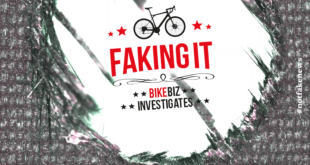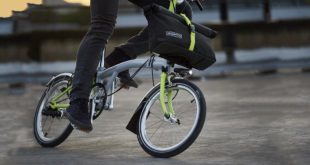There are many fake Specialized products available online, but there would be an awful lot more if it weren’t for Andrew Love, head of Specialized’s brand security division. Love and his multi-lingual team of fifteen aim to spot the fakers, and zap them. Based in Specialized’s distribution centre in Salt Lake City, Utah, 780 miles from the mother-ship in Morgan Hill, California, Love has an ink-heavy business card. Not only does it say he’s Specialized’s head of brand security, global investigations, and legal enforcement but it also says it in Mandarin Chinese. His Chinese nickname – "Tiger watching the Tigers" – is based on his tenacity; he’s been zapping the fakers since 2008, and also, he explains, because "I have a very orange-redhead freckly complexion."
An elite speed skater in a former life, Love is a self-taught zapper of fakes, not an IP lawyer; he is now one of the most experienced investigators in the industry. In the first seven months of 2015, Love and his widely-dispersed team – based at offices in both America and Asia – took down more than $5m in fake inventory from Alibaba websites alone. Specialized’s brand security team prevent about $15m of fake goods reaching the market each year.
BIKE BIZ: Which languages are used in Specialized’s brand security division?
LOVE: Our target languages are pretty much everywhere a bike is popular. Our staff is all over the world. Since Google serves searches very hyper-locally, hunting is better when you have locals doing the hunting. Also, locals have more credibility with their own country’s customs and law enforcement.
BIKE BIZ: Are frame molds copied secretly? Or are CAD drawings leaked? Or are 3D scanners being used to capture frame shapes?
LOVE: They measure out differently and have differing tube shapes when you put calipers to them. Multiple data points clearly show they were re-engineered from our bikes, with no access to our CAD or molds.
BIKE BIZ: Why are folks buying fakes?
LOVE: My experience is that human beings have a great capacity to delude themselves when they think they can save money. Greed trumps reason for some, over and over. Just because you really want to believe you can buy a $3000 frame for $700, doesn’t make it safe to ride, or the same thing. There are "pirate-inclined" consumers. I’ve had long conversations with several. In general, I find them to be narrow-minded people for whom money simply trumps every single other reality, including their safety. On the flip side, some fakes are sneaking into online marketplaces, and being sold at retail prices, so it’s often more complicated to keep yourself safe than just price watching. [Buying from] your local bike shop is the safe bet for so many reasons.
BikeBiz: How safe are open-mold frames?
Love: Who do you think is more committed to high quality, safe products? Authentic dealers or people who are selling anonymously over the internet to people who they will never meet, and can never reach them when things go wrong? This is the difference with a publicly visible company; their stuff needs to be top notch, or they run terrible legal consequences.
BikeBiz: One of the frequently heard claims is that fake products are made by the same factories that produce the real stuff, but on a "third shift". How valid is this?
Love: It might be true in other industries, but absolutely not in cycling. This idea is one of those lies I’ve seen people repeat to themselves over and over to convince themselves that these items are not produced by organised crime (they are) and that the products are safe. Our riders and dealers get very angry when they spot counterfeits. People get upset when fake bikes show up in the local fast-moving paceline rides. I’ve got a fake Venge next to my desk here whose bottom bracket cracked right through as the rider hit a pothole during a group ride. He didn’t crash, so he was lucky. The most important thing is that when you decide to buy from a Specialized dealer you are buying from people who ride bikes themselves. Safety is personal for our dealers and for all of us who work here at Specialized. We all ride. This makes a vast difference.
BikeBiz: Which sites are good at accepting take-downs, and which are cumbersome?
Love: eBay is great, Facebook is great, Aliexpress has aspirations to be great – and since they have gone public they have thrown a lot of money and people at the problem. Their problem is that they have a huge criminal seller-base that overwhelms their efforts. Amazon is quite slow and uncommunicative. Any time you go onto a local message board, or a closed Facebook cycling parts selling group, you are rolling the dice. I’ve never seen authentic Specialized items for sale on Aliexpress/Alibaba, not once.
BikeBiz: Does Specialized also employ a legal outside outfit for IP or is your division handling it all?
Love: We handle almost all of it, no one is more passionate than a company’s own people. Keeping this internal at Specialized has allowed us to work consistently on this, and not just do a sweep once or twice a month like many outside agencies do. I had a whole year of working every Sunday because the carbon saddle counterfeiters were putting things up on eBay on weekends. Even for dedicated companies with people scouring every day, the internet is an awfully huge place, and social media creates waterfalls of content every second.
BikeBiz: What do you say to those consumers who believe they are being "ripped off" by cycling brands?
Love: No one gets uber-rich in cycling. This is a passion-based industry where people work incredibly hard and incredibly long hours primarily because they love bikes. This is true at your local shop, and it’s true at Specialized as well. When a rider purchases an authentic product, they are purchasing creativity and inspiration, built from the ground up to serve a specific rider benefit that has been put through countless safety tests. We ride all this stuff ourselves. The counterfeiters don’t test and don’t care what happens to the buyers of these products. A counterfeit seller views his customers as disposable.
BikeBiz: What do you think should be done to educate consumers on why they should not buy fake products?
Love: You are doing it right now. We greatly believe in the education that needs to happen for riders to fully understand the danger and risk of purchasing counterfeit products, and how fakes can sneak into e-commerce marketplaces and social media channels. Your interest as a [magazine], and addressing this complicated issue objectively, is really important. I hope media coverage around this topic will help keep riders safe.
Faking it – Inside the shady world of counterfeit bikes, clothing and parts is a series of 20 articles. For offline reading convenience the 25,000 words can be found on an illustration-rich PDF, a Kindle file, an eBook and a Word document.
 BikeBiz Bicycle and cycling retail news
BikeBiz Bicycle and cycling retail news




